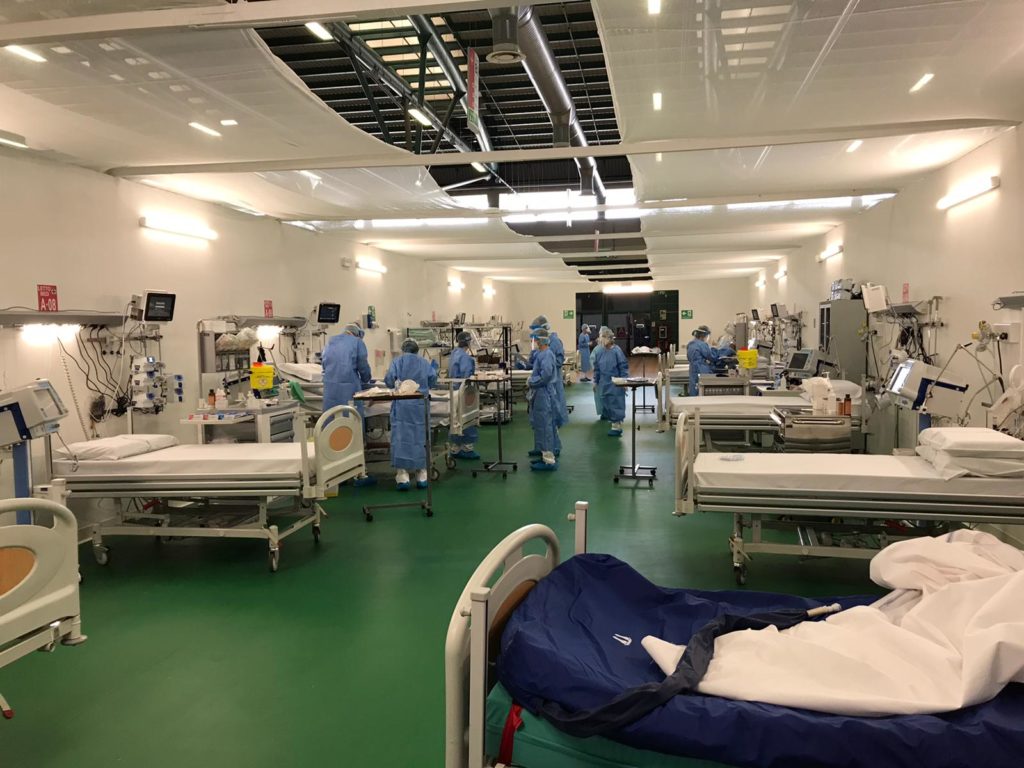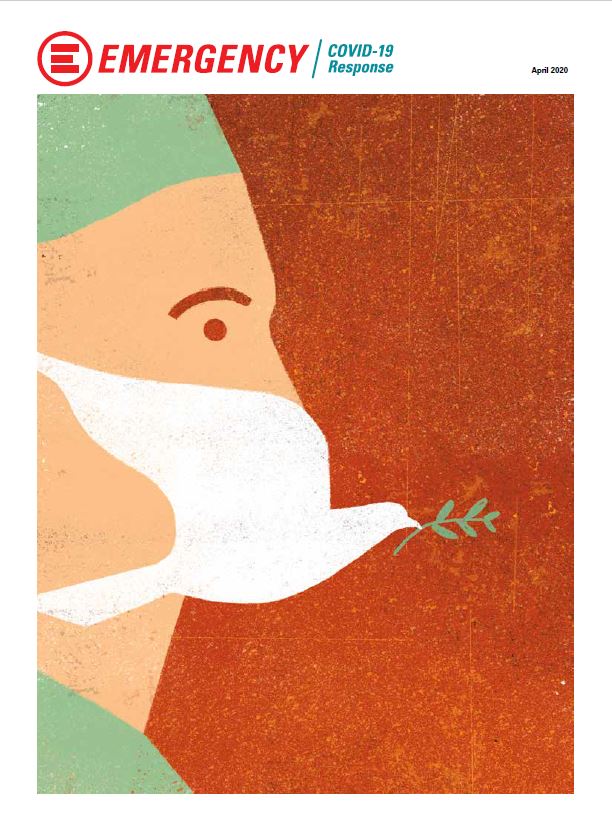EMERGENCY is working around the world to fight this global pandemic.
COVID-19: Here is what we are doing.
EMERGENCY has given the authorities all the help it can to manage the coronavirus outbreak.
We have put our expertise in treating patients in the midst of epidemics, honed in Sierra Leone in the Ebola outbreak of 2014 and 2015, at the disposal of the health authorities.
Our projects around the world
In all our projects around the world, we have activated specific protocols to prepare for the arrival of the virus, even in countries not affected by the pandemic so far. Through specific staff training, the formation of triage areas, and the compartmentalisation of spaces and patient flows, we will be able to intercept suspected cases, report them to the health authority responsible, and minimise the risk of infection within our facilities.
Documents and Protocols
To help hospitals and reception shelters to managing the epidemic, we provide our protocols on how to manage the COVID-19 epidemic.
Our projects in Italy
In Calabria: our collaboration with the local Civil Protection
Between December 2020 and mid-February 2021, our medical staff worked at the Covid-2 department of the San Giovanni di Dio hospital in Crotone, managing a department of 25 beds in the hospital structure plus, other 8 beds in the ward in the field hospital, ready for further COVID-19 necessities.
We remain at the disposal of the Regional Commissioner and of the Civil Protection in case of further need in the near future.
EMERGENCY carries on the activities in Polistena. We run a clinic in a building confiscated from the ’Ndrangheta. Here we look after the most vulnerable people in the area who cannot get treatment elsewhere. EMERGENCY will start doing swab tests in Polistena this week at the mayor’s request.
In Polistena, between mid-November and mid-December 2020, we were also active with a rapid swab service for the most vulnerable people in the area and those most at risk from the virus.
In Milan, Rome, Piacenza, and Naples: ‘Nobody Left Behind’

The medical crisis that’s enveloped Italy over the last few months is beginning to leave another crisis in its wake. A new poverty is becoming a daily reality for many people. Large families, old people living alone, poor young people and workers in the industries hardest hit by the crisis have found themselves struggling to feed themselves and their children day to day.
It was to help those people that we launched ‘Nessuno escluso. Neanche chi è ora in difficoltà’ (‘Nobody Left Behind: Supporting those in need through unprecedented times’). The project will deliver free packages of food and basic goods to people who need help at this difficult time and have nowhere else to go.
The project is currently running in Milan, Piacenza, Rome and Naples. The end goal is to reach households hit by the social and economic fallout of the COVID-19 epidemic.
Nobody Left Behind: Read the full, in-depth report
A recent study shows that more than a million people can no longer afford food and basic goods. We’re facing an unprecedented social crisis, one that’s carved out a new class of vulnerable people, until now under the radar of traditional or state support. So, we decided to run a project outside of the medical sphere, to spread a message of solidarity and help people get by with dignity.
Rossella Miccio, president of EMERGENCY
In Milan
The switchboard for information and awareness related to Covid-19 is now active. Our volunteers and staff are available to give information on appropriate behaviours, best practices to adopt, and prevention. In addition, they will provide assistance in orienting people among the competent services in the Milan area.
It is possible to call the switchboard at 02 86316892, from Monday to Friday from 9.30 to 13.00.
Milano Aiuta (Milan Helps)

EMERGENCY answered the municipal government of Milan’s call for support services for the city’s people, offering its full help to tackle the coronavirus outbreak.
Using the government’s platform Milano Aiuta (Milan Helps), EMERGENCY is running a service delivering goods – food, medicine and other basic items – to people over 65, who have been ordered to quarantine themselves, and vulnerable people who cannot risk leaving their homes.
The project – which ended at the end of May – involved 320 volunteers, 60 tons of food and basic goods handled, 6,370 deliveries, with an average of over 100 deliveries per day and over 3,000 families helped.
Following the highly relevant number of requests, at the end of October 2020, the “Milan helps” project was activated again.
Our support for migrants and homeless people
To fight the spread of Covid-19 among the most vulnerable people in society, we provide medical consultation and socio-medical education for homeless people in the Milan area.
It involves monitoring in shelters for homeless people and unaccompanied migrant children within the SIPROIMI (formerly SPRAR) system, including intermediary shelters and certain gypsy camps pointed out to us by Milan’s municipal government.
Our medical and logistical staff give consultation on sanitation and prevention measures, handling the flow of clean and dirty items, separation of spaces and inside and outside support services (meals, cleaning, laundry, rubbish and so on), in line with the measures suggested by the Ministry of Health for containing the virus.
We write a report offering solutions, assess whether further support is needed, and flag up changes that the council need to make to shelters in order to protect the health of their staff and residents.
In Camerino
In Camerino, from the end of April and July 2020, we launched a psychological support initiative for health workers, former coronavirus patients and families of people still suffering from the disease.
All services respected fully the current legislation on social distancing, and personal protection is worn throughout by both staff and users. There was also a triage procedure to contain the virus, as at all our facilities in Italy and elsewhere, with a view to public health.
In Piedmont
From May to July 2020 we supported project at state-run care homes – among the hardest hit by the COVID-19 medical crisis in Italy – where we provide training, advice and monitoring to protect the health of both their residents and their staff.
With a team made up of a nurse, a logistician and an EMERGENCY doctor, we carried out inspections and monitoring interventions, providing health and logistic consultancy and sharing specific protocols on sanitation, prevention, management of dirty-clean flow, compartmentalization measures, correct management of spaces, sanitation of environments, prompt observation of guests, detection of symptoms compatible with Covid-19 and isolation of positive cases.
The project was run in collaboration with the regional government of Piedmont and Confindustria Piemonte.
“Domiciliarità” Project
A service thought for people who are over 65, lonely, who quarantined themselves, vulnerable and at risk of movement: the health emergency caused by COVID-19 has forced people within the walls of their homes for many weeks. For some, more than others, it meant complete isolation and impossibility to carry on with most of the ordinary habits such as going to the supermarket, going to the pharmacy or finding basic and important items. In several Italian cities, we have worked hard with a network of volunteers throughout the country to make up for the isolation of people, by activating a free delivery service of goods, medicines and basic items. In accordance with all the preventive measures against risks of COVID-19 contagion throughout our activity, we have shortened distances, coming out all together stronger than before.
In Bergamo

In Bergamo, an EMERGENCY team made up of 80 medical and logistical staff worked at the Intensive Care Unit at the Field Hospital in Bergamo, operated by the Papa Giovanni XXIII hospital.
EMERGENCY helped to construct the facility alongside approximately 300 volunteers, including artisans from the city (carpenters, electricians, plasterers, plumbers and painters), 150 volunteers from Sanità Alpina, and 40 from the logistics department of the Ana Civil Protection.
On 26 May, medical work at the Field Hospital drew to a close. The facility was turned into a clinic for follow-up checks on patients with the virus who need monitoring.
We have proposed an effective reorganization of spaces and flows, to reduce the risks of contagion as much as possible. Every detail of the structure is essential to contain it: it is essential that each area is compartmentalized, that the dressing /undressing places are well defined, that the rules regarding movement of people are planned in advance. We are deploying our experiences learned in Sierra Leone during the Ebola epidemic. To do this, we called back some of our colleagues who worked abroad: we are trying to do our part in such a delicate moment for Italy.
Rossella Miccio, President of EMERGENCY
In Brescia
We worked with the Health Department at Brescia hospital to protect healthcare personnel and the hospital from contagion.
By offering the experience we gained in Sierra Leone during the Ebola epidemic, our team of medical and logistic staff set up a plan to reduce COVID-19 risks as much as possible.
In our other projects in Italy

We go on working at our clinics in Italy, using a triage method to identify patients with symptoms that could point to the virus. We will also continue providing information, consultations and direct them to the services they need, all for the good of public health.
A lot of the patients we already help in Italy are among the most vulnerable people in society – like migrants, homeless people and travellers – and they are struggling even more now to get services.
Information and prevention among minority groups
Our cultural mediators have recorded short videos in different languages, so that even at distance everyone can be updated on what action must be taken to prevent further outbreak. Even a tutorial that circulates via WhatsApp can encourage virtuous and responsible behaviour!
What we can all do
Every one of us can help right now to halt the spread of the virus, by following the medical authorities’ instructions to the letter. Wash your hands regularly and thoroughly, keep a sensible distance from other people and avoid going out and having contact with them unless absolutely necessary.
You can find all the instructions and information you need at the Italian Ministry of Health’s website: www.salute.gov.it/nuovocoronavirus. Please do also pay attention to advice published by the WHO and local health authorities.
Everyone must play their part if we are to protect society as a whole.
We want to tell you more about how EMERGENCY has responded to the COVID-19 pandemic.
Click the image below for more information.

EMERGENCY’s COVID-19 response activities have also been made possible thanks to Caritatis Stiftung (Liechtenstein).

